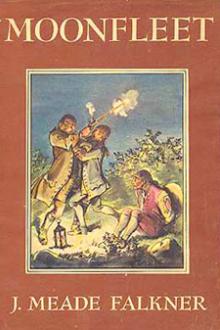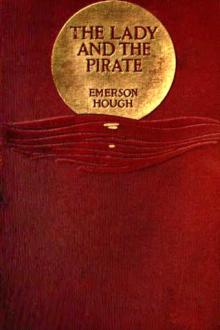Genre Adventures. Page - 3

e blue wavesof the great Pacific. A little way behind them was the house, a neatframe cottage painted white and surrounded by huge eucalyptus andpepper trees. Still farther behind that--a quarter of a mile distantbut built upon a bend of the coast--was the village, overlooking apretty bay.
Cap'n Bill and Trot came often to this tree to sit and watch theocean below them. The sailor man had one "meat leg" and one "hickoryleg," and he often said the wooden one was the best of the two. OnceCap'n Bill had commanded and owned the "Anemone," a trading schoonerthat plied along the coast; and in those days Charlie Griffiths, whowas Trot's father, had been the Captain's mate. But ever since Cap'nBill's accident, when he lost his leg, Charlie Griffiths had beenthe captain of the little schooner while his old master livedpeacefully ashore with the Griffiths family.
This was about the time Trot was born, and the old sailor becamevery fond of the baby girl. Her real name was Mayre, but when shegrew big

d a little round long-necked bottle, from which he poured out a glass for Ratsey and himself. Then he half-filled the third, and pushed it along the table to me, saying, 'There, take it, lad, if thou wilt; 'twill do thee no good, but may do thee no harm.'
Ratsey raised his glass almost before it was filled. He sniffed the liquor and smacked his lips. 'O rare milk of Ararat!' he said, 'it is sweet and strong, and sets the heart at ease. And now get the backgammon-board, John, and set it for us on the table.' So they fell to the game, and I took a sly sip at the liquor, but nearly choked myself, not being used to strong waters, and finding it heady and burning in the throat. Neither man spoke, and there was no sound except the constant rattle of the dice, and the rubbing of the pieces being moved across the board. Now and then one of the players stopped to light his pipe, and at the end of a game they scored their totals on the table with a bit of chalk. So I watched them for an hour, knowing the game my

g himself into liberty and a pension at last, or hadto go out of his gas-lighted grave straight into that other dark onewhere nobody would want to intrude. My humanity was pleased to discoverhe had so much kick left in him, but I was not comforted in the least. Itoccurred to me that if Mr. Powell had the same sort of temper . . .However, I didn't give myself time to think and scuttled across the spaceat the foot of the stairs into the passage where I'd been told to try.And I tried the first door I came to, right away, without any hangingback, because coming loudly from the hall above an amazed and scandalizedvoice wanted to know what sort of game I was up to down there. "Don'tyou know there's no admittance that way?" it roared. But if there wasanything more I shut it out of my hearing by means of a door markedPrivate on the outside. It let me into a six-feet wide strip between along counter and the wall, taken off a spacious, vaulted room with agrated window and a glazed door givin

is eyes. He breathed hard. At last he said, "Dear Father in Heaven, I live. Thou hast saved me. I thank Thee."
VII
THE FIRST NIGHT ON LAND
"Where are my companions?" That was his first thought. He began to call and halloo: "Where are you?" "Come here!" But no one answered. Then he wished to see if anyone lived on the land, and he cried, "Is there no one here? Hello!" but all remained still.
All at once he drew himself together and shrank back. He heard a bush rustle and the thought came like a flash, "That is a wild animal that will pounce upon me and tear my flesh with his teeth and claws. How shall I save myself? Where shall I fly for safety? Where shall I turn? I have nothing but my clothes and my life saved from the water. All that I had the waves have swallowed up."
And then hunger and thirst began to trouble him. He had eaten nothing the whole day and the salt water had made him sick.
In the meantime the night had come on. Robinson was very tired. Everythin

invariable custom of the house; and sat in a dead silence, that seemed natural to the great sober room.
This, however, was not for want of a topic; on the contrary, they had a matter of great importance to discuss, and in fact this was why they dined tete-a-tete. But their tongues were tied for the present; in the first place, there stood in the middle of the table an epergne, the size of a Putney laurel-tree; neither Wardlaw could well see the other, without craning out his neck like a rifleman from behind his tree; and then there were three live suppressors of confidential intercourse, two gorgeous footmen and a somber, sublime, and, in one word, episcopal, butler; all three went about as softly as cats after a robin, and conjured one plate away, and smoothly insinuated another, and seemed models of grave discretion: but were known to be all ears, and bound by a secret oath to carry down each crumb of dialogue to the servants' hall, for curious dissection and boisterous ridicule.
At

Co., bankers, of Liverpool. I join herewith a series of cheques, signed by me, which will allow you to draw upon the said Messrs. Marcuart for the above-mentioned sum. You do not know me, but that is of no consequence. I know you: that is sufficient. I offer you the place of second on board the brig Forward for a voyage that may be long and perilous. If you agree to my conditions you will receive a salary of 500 pounds, and all through the voyage it will be augmented one-tenth at the end of each year. The Forward is not yet in existence. You must have it built so as to be ready for sea at the beginning of April, 1860, at the latest. Herewith is a detailed plan and estimate. You will take care that it is scrupulously followed. The ship is to be built by Messrs. Scott and Co., who will settle with you. I particularly recommend you the choice of the Forward's crew; it will be composed of a captain, myself, of a second, you, of a third officer, a boatswain, two engineers, an ice pilot,

whispered the pirate captain dubiously, aside.
"Speak on!" again commanded he of the blue eyes. "But your life blood dyes the deck if you seek to deceive Jean Lafitte, or Henry L'Olonnois!"
(So then, thought I, at last I knew their names.)
In reply I reached to my belt and drew out quickly--so quickly that they both flinched away--the long handled knife which, usually, I carried with me for cutting down alders or other growth which sometimes entangled my flies as I fished along the stream. "Listen," said I, "I swear the pirates' oath. On the point of my blade," and I touched it with my right forefinger, "I swear that I pondered on two things when you surprised me."
"Name them!" demanded Jimmy L'Olonnois fiercely.
"First, then," I answered, "I was wondering what I could use as a cork to my phial, when once I had yonder Anopheles in it----"
"Who's he?" demanded Jean Lafitte.
"Anopheles? A friend of mine," I replied; "a mosquito, in short."
"Jimmy, he's cr

't," said Edwards.
"You're on," said Carter.
"Let me in," suggested Ives.
"And I'll take one of it," said McGuire.
"Come one, come all," said Edwards cheerily. "I'll live high on the collective bad judgment of this outfit."
"To-night isn't likely to settle it, anyhow," said Ives. "I move we turn in."
Expectant minds do not lend themselves to sound slumber. All night the officers of the Wolverine slept on the verge of waking, but it was not until dawn that the cry of "Sail-ho!" sent them all hurrying to their clothes. Ordinarily officers of the U.S. Navy do not scuttle on deck like a crowd of curious schoolgirls, but all hands had been keyed to a high pitch over the elusive light, and the bet with Edwards now served as an excuse for the betrayal of unusual eagerness. Hence the quarter-deck was soon alive with men who were wont to be deep in dreams at that hour.
They found Carter, whose watch on deck it was, reprimanding the lookout.
"No, sir," th

ll the world on his mountain-pile of history and romance. Longfellow, I believe, is not yet at the Oxbow, else the winged horse would neigh at him. But here in Lenox I should find our most truthful novelist [Miss Sedgwick], who has made the scenery and life of Berkshire all her own. On the hither side of Pittsfield sits Herman Melville, shaping out the gigantic conception of his 'White Whale,' while the gigantic shadow of Greylock looms upon him from his study window. Another bound of my flying steed would bring me to the door of Holmes, whom I mention last, because Pegasus would certainly unseat me the next minute, and claim the poet as his rider.'
While at Pittsfield, Mr. Melville was induced to enter the lecture field. From 1857 to 1860 he filled many engagements in the lyceums, chiefly speaking of his adventures in the South Seas. He lectured in cities as widely apart as Montreal, Chicago, Baltimore, and San Francisco, sailing to the last-named place in 1860, by way of Cape Horn, on the Meteor, com

ied; in which the narrator of the tale finds himself unexpectedly involved both on its ruthless and its delicate side.
"Falk" shares with one other of my stories ("The Return" in the "Tales of Unrest" volume) the distinction of never having been serialized. I think the copy was shown to the editor of some magazine who rejected it indignantly on the sole ground that "the girl never says anything." This is perfectly true. From first to last Hermann's niece utters no word in the tale -- and it is not because she is dumb, but for the simple reason that whenever she happens to come under the observation of the narrator she has either no occasion or is too profoundly moved to speak. The editor, who obviously had read the story, might have perceived that for himself. Apparently he did not, and I refrained from pointing out the impossibility to him because, since he did not venture to say that "the girl" did not live, I felt no concern at his indignation.
All the other stories were serialized. The "Typh